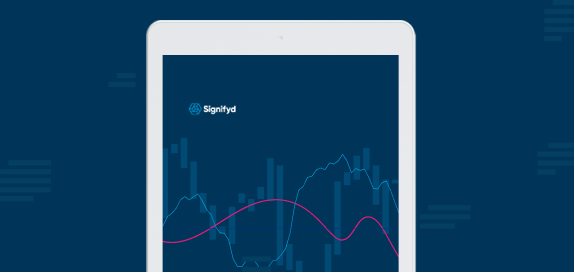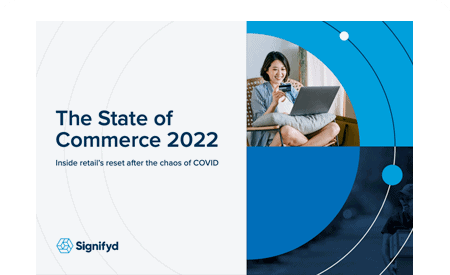To say that the last few years have been a challenge for retailers is an understatement. Supply chain inefficiencies, market volatility and rising prices have put a damper on the ecommerce sector after two years of steady growth.
And a looming recession promises to make the digital retail landscape even more challenging. Retailers are also feeling the squeeze between rising acquisition costs and soaring fulfillment and omnichannel costs.
Daren Hull, president of Vera Bradley, recently sat down in New York with Indy Guha, Signifyd’s chief marketing officer, to discuss how the popular lifestyle brand plans to unlock growth and navigate through today’s economic uncertainty.
“We can argue if we are in a recession or not,” Hull told Guha at CommerceNext 2022, a conference for retail marketing professionals. “But what I would say from what I see and what we’re pretty open with Wall Street about is that a customer who has a household income under $55,000 is in a recession already.”
Ecommerce sales were $870 billion in the US in 2021, according to Forbes, a 14.2% increase over 2020 and a 50.5% increase over 2019. ecommerce represented 13.2% of all retail sales in 2021 in the US.
Hull concedes that growth is becoming more difficult for e-tailers in 2022, but he remains bullish about the future. He is focusing less on short-term revenue and is taking a full-funnel view of the lifetime value of his customers.
“Depending on the source you look at, ecommerce contracted for the first time I can remember since 2008,” Hull said. “Now you need to get to the finer steps and be more methodical about what you are looking at inside the larger funnel.”
Vera Bradley, Inc. operates two unique lifestyle brands – Vera Bradley and Pura Vida. Vera Bradley and Pura Vida are complementary businesses, both with devoted, emotionally-connected, and multi-generational female customer bases; alignment as casual, comfortable, affordable, and fun brands; positioning as “gifting” and socially-connected brands; strong, entrepreneurial cultures; a keen focus on community, charity, and social consciousness; multi-channel distribution strategies; and talented leadership teams aligned and committed to the long-term success of their brands.
Hull offered up these tips to other ecommerce retailers on how to maintain profitability and growth during choppy economic seas:
Get back to basics
During a recession, it is important for retailers to get back to basics. “Recessions have a tendency to remove inefficiencies from the market,” Hull said. Vera Bradley analyzes the overall customer journey. Beyond having a quality product and recording high conversion rates, e-tailers also need to look at basics such as consumer credit, payment methods, fraud filters, shipping costs and return rates.
Engage with your customers
Engaging with your customer is one of the most important strategies for online retailers to focus on in difficult economic times, Hull says. But he believes it is essential to engage “across a wide range of economic positions so that you can get an understanding of what people are doing” throughout the customer journey.
Hull stresses that to be fully engaged with the customer, companies need to look at more than data. Vera Bradley has a VIP customer group that provides feedback to executives and has an active fan-run Facebook group page that is closely monitored.
Vera Bradley also places an emphasis on listening to customer service complaints. “We have a phone booth in our office so at any given point in time you can pick up and catch a random customer service call.”
Organize for problem solving
“Make sure you know whose job it is to fix the problem. Do you know who owns looking for vulnerabilities? I tend to divide it up into the moment that somebody puts something in the cart and the moment somebody hits checkout and tries to complete the transaction.” Hull said. “It doesn’t have to be the president of the brand, but you should know who it is I am going to talk to” if there are issues that need to be addressed.
Keep it simple
Simple things make a big difference – especially when you are looking for growth in a down economy. “Sometimes you need to slow down to go fast,” Hull says. The ecommerce industry will get through this economic downturn by keeping it simple. “Sometimes it’s not glorious work and it may not be something you want to hear, but it’s being able to look in the mirror and say that you’re coming in every day and you’ve got your team focused on the right things,” he said. “You’re trying to preserve cash. You’re trying to capture the sales and get rid of the waste.” By not overcomplicating the strategy, Hull suggests, most companies will survive today and thrive tomorrow.
What the ecommerce future looks like
Hull has been a survivor of the 2001 economic downturn and the 2008 recession and feels confident the ecommerce industry is poised for more growth. “We’ll get to the other side and we’ll get back to double-digit growth rates and it will feel good.”
Photo courtesy of CommerceNext
Looking to unlock revenue and grow your margins? We can help.









